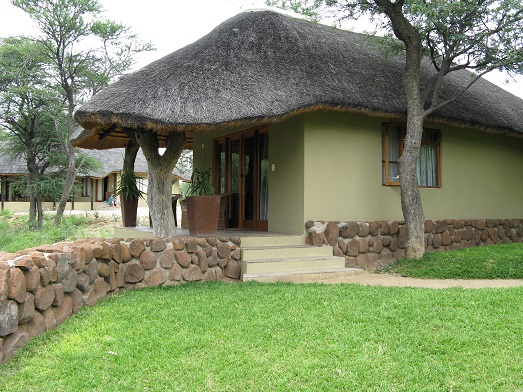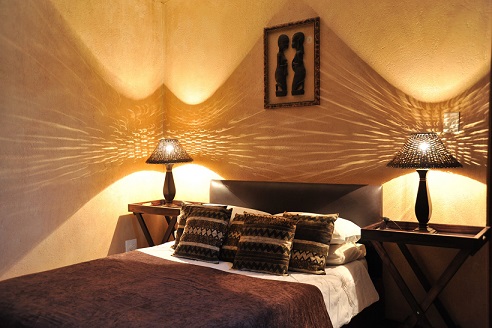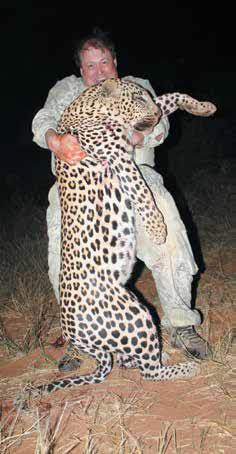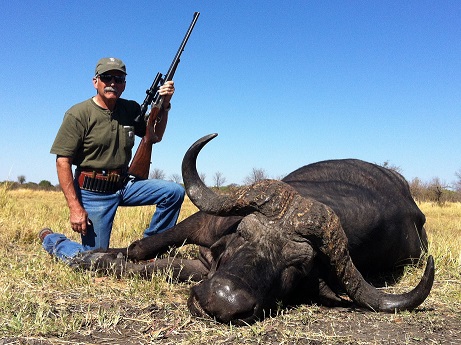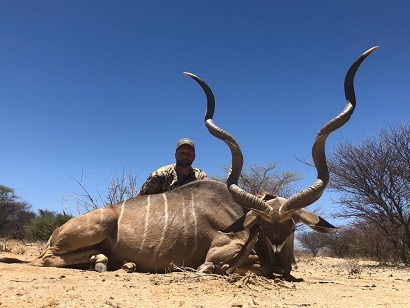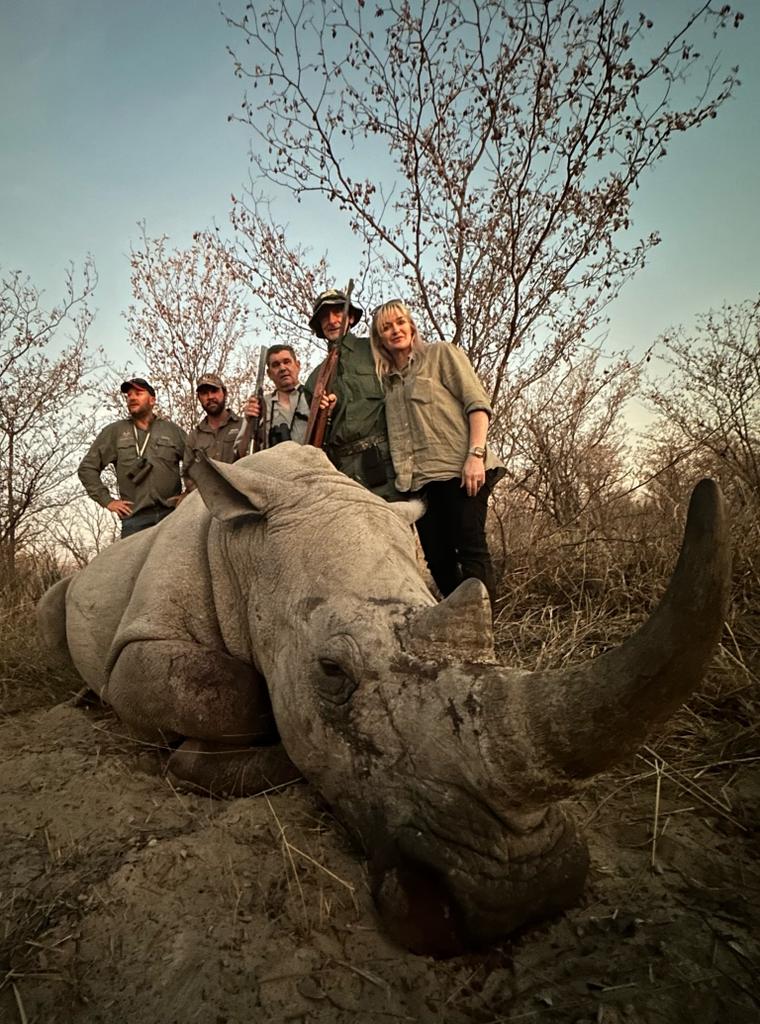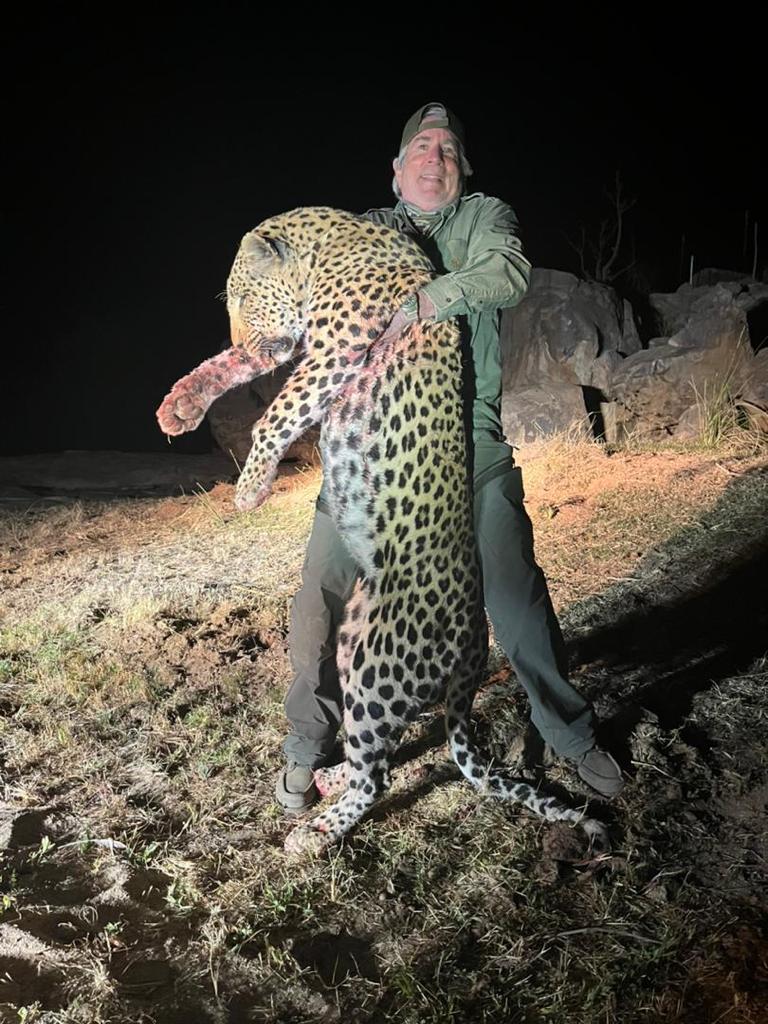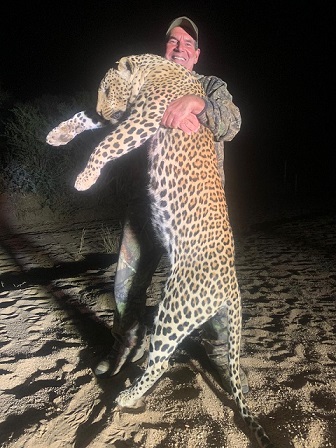Unlike South Africa, where most of the hunting is high-fenced, much of Namibia is still low fence/no fence. Although there is nothing wrong with high-fence operations, as these properties are typically very large, and the fences are usually meant more to keep animals (and poachers) out than to keep animals in, Namibia offers a comparable variety and abundance of plains game species, and is a perfect destination for hunters who prefer free-range safaris. As the second-least densely populated country in the world, Namibia is simply an excellent place to both see wildlife and to hunt.
Raised on a game farm, this 2nd generation PH’s love of nature and passion for hunting started at a very early age. His father began offering trophy hunts in the early 70s and was one of only three PHs in Namibia at that time. Today, this PH and his wife personally run their operation and will make sure that you have a world-class experience, from the first day of arrival to the last day of departure. They will make sure that you return safely home and receive your trophies in good order (usually shipped within 4 months following your trip). They cater to individuals, families and groups of all ages, whether first-time or experienced African hunters, and they also offer a host of non-hunting activities that spouses and children can enjoy while you’re on the hunt. Don Sangster from our Canadian office, along with his non-hunting wife, did his first African safari with this outfitter a number of years ago, and they had an outstanding and memorable trip.
Their hunting season starts February 1 and runs through to the end of November. They hunt a total of about 300,000 free-range acres in the central Namibian highlands (along with some high-fenced ranches). Properties are generally very large, and are typically active ranches (mainly cattle). This area consists of savannah thorn bush, dry river beds, and mountainous country, and is famed for its variety and quality of game, with about 30 different species available to hunt. One of their most popular species is leopard, and there is no finer leopard man in Namibia than this PH. It is his specialty, and success is about 98%! They don’t even need to hunt at night! In the last 15 years they have taken around 150 leopards and you only stay in the blind until about midnight.
This outfitter also offers a limited number of big game safaris in the majestic, unspoiled and game-rich Zambezi Region (formerly known as Caprivi Region), in the northern part of the country. This government-owned concession is virtually untouched and teeming with wildlife, and not only offers the most incredible hunting you’ll ever experience, it also lets you experience nature in its wildest state. Very few people get the opportunity to explore this virtually uninhabited area where animals reign supreme. If tracking massive herds of mighty Cape buffalo and elephant and stalking huge crocodiles and hippos in an environment that will take your breath away is what you’re looking for, consider a safari in the Zambezi Region.
This outfitter also prides themselves on offering one of the best bowhunting experiences in Namibia. Bowhunting is mostly done from well-constructed blinds at waterholes and game trails, but also stalking if the possibility presents itself. No import permit is required for bows (crossbows are not permitted).
PLEASE NOTE, HOWEVER, THAT BOWS ARE NOT LEGAL FOR HUNTING LEOPARDS IN NAMIBIA.
In addition to outstanding hunting for plains and big game, Namibia is also home to some of the world’s finest sporting birds. Namibia has 20 different huntable game species, with some of the most popular to hunt are being Burchell’s sandgrouse, Namaqua sandgrouse, red-billed spurfowl, helmeted Guinea fowl, rock pigeon, Cape turtle dove, and mourning dove. Doves and sandgrouse are hunted over waterholes. Helmeted Guinea fowl, the most widespread upland game bird, and francolin, are hunted by flushing them in the dry river beds and open grassland areas. A day or two of upland bird hunting makes a great addition to any safari, and is best topped off with a freshly-prepared delicious meal of the day’s harvest, using a traditional family recipe.
2024 PRICES (all prices are in USD and are subject to change without notice until deposit received)
As is the case with most safari operators in Africa, pricing consists of a base daily rate for whatever number of days you’d like, plus trophy fees for all species harvested (or wounded). We like this pricing structure because you only pay for those species that you bag, and there is lots of incentive for the PH to put you on game. But customized packages can also be put together, so please call us for a quote.
DAILY RATES (15% V.A.T. to be added to all daily rates unless otherwise indicated)
Plains game – $550/day
Leopard – $700/day (specials available at times; call for a quote!)
Big game in Zambezi Region (elephant, Cape buffalo, hippo) – $1,000-$1,500/day (inclusive of 15% V.A.T.)
Observers – $250/day
Arrival/departure days – $180 each per person for plains game/leopard, $200 each per person for big game
TROPHY FEES (you are permitted up to 2 of each species on the permit)
BABOON $250
BLACK WILDEBEEST $1,350
BLACK-FACED IMPALA $3,300
BLESBOK $1,140
BLUE WILDEBEEST $1,350
CARACAL $750
Giraffe $3,500
DIK-DIK DAMARA $3,500
DUIKER $450
ELAND CAPE $2,900
GEMSBOK/ORYX $750
HARTEBEEST $1,200
IMPALA $680
JACKAL $250
KLIPSPRINGER $3,500
KUDU $2,800
LEOPARD $10,000
OSTRICH $750
SPRINGBOK $650
STEENBOK $450
NYALA $5,000
TSESEBE $4,800
LECHWE (RED) $4,300
ROAN $9,000
SABLE $9,000
WARTHOG $450
WATERBUCK $2,900
ZEBRA Burchell (Plains) $1,350
ZEBRA Hartmann (Mtn.) $1,350
OTHER CHARGES
Hunting Permits – $100
Leopard Permits – $100
Leopard Tag – $3,000
Airport Transfers – $550 per party
2024 Specials
14 day leopard hunt inclusive of 14 hunting days, arrival and departure days, airport transfer, leopard tag and trophy fee on one leopard– $19,750
Above leopard hunt and add on a Rhino up to 18” for a package price of $52,500 for 2 of the big 5!
GETTING YOUR FIREARM INTO NAMIBIA
Top-quality rifles with scopes are available for rent from the outfitter. For those who wish to bring their own rifles, gun permits to enter Namibia are not required in advance, and there are few restrictions on the temporary importation of hunting rifles. You will receive a form to fill out upon your arrival and the permit will be issued at the airport – the process is uncomplicated. A representative of the outfitter will be at airport to assist if any issues arise. However, please be aware that South Africa is very strict with regard to importation of firearms. IF YOU PLAN TO TRAVEL WITH YOUR FIREARMS AND PLAN TO STOP IN SOUTH AFRICA AT ALL, YOU WILL NEED TO APPLY FOR FIREARMS IMPORT PERMIT FROM SOUTH AFRICAN POLICE. That process is very strict and a bit complicated, but there are agents/services available to assist you with it (ask us for a recommendation). You will most likely have to transit through South Africa to get to Namibia, but if your luggage is ticketed straight through to your final destination, then there should be no issue. But if you have to take possession of your firearms for any reason while transiting through South Africa, you will have to abide by South Africa’s firearms importation laws. IF YOU DON’T, YOUR FIREARMS MAY BE CONFISCATED BY SOUTH AFRICAN AUTHORITIES.
A maximum of two firearms per hunting client is allowed. Firearms must be packed separately, unloaded, in a sturdy, lockable case. A maximum of 80 rounds of ammunition per weapon may be imported (it must match the rifle’s specific caliber). Ammunition must be in its original packaging, in a sturdy, lockable case, and it must be checked in with your luggage (but always check the specific rules of all airlines you will be flying).
The following is not permitted in Namibia:
• Automatic and semi-automatic weapons (AK-47 and other military hardware)
• Handguns
• Solid-point cartridges
• Blackpowder or percussion caps may not be imported, but they are legal to hunt with (can be purchased in Namibia)
GETTING THERE
Fly to Windhoek, the capital of Namibia, where the outfitter will meet you and drive you to camp a few hours away. Depending upon what time your flight arrives/departs, you may need to overnight in Windhoek. Most flights connect to Windhoek via Johannesburg, South Africa. Travel visas are not required in advance.
ACCOMMODATIONS
The main lodge overlooks a floodlit water hole to allow for uninterrupted game viewing and photography. All suites are roofed with a traditional African grass called thatching, a unique style of roofing that helps retain the heat in winter and keeps the room cool in summer. All suites have an en-suite bathroom with hot and cold running water and electricity.
Cellphones are now more common than land lines in Namibia and the cell reception at the lodge is good. If you’ll be using your cellphone, remember to arrange international roaming with your service provider prior to departure. There is free WIFI in the common areas of the main lodge, and the office at the lodge has a computer with an internet connection which guests can use free of charge.
SIGHTSEEING
This outfitter also offers customized photographic, sightseeing and fishing safaris throughout Namibia. They can also assist you to plan a charter boat or shore fishing adventure along the country’s majestic coastlines, including the Skeleton Coast. Tours of nearby attractions such as game preserves and national parks, including Etosha National Park, can also be arranged. Shopping trips or time spent just relaxing around the pool with a refreshing drink will appeal to the non-hunters in your group. At night, everyone can share the day’s adventures with stories around the campfire.
HUNT NATION – MAKE YOUR AFRICAN SAFARI DREAMS A REALITY!
307-637-5495; info@hunt-nation.com; www.hunt-nation.com

